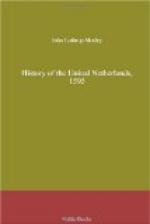Nevertheless the politic Gascon subsequently regretted the fierce style in which he had fulminated his challenge. He was accustomed to observe that no state paper required so much careful pondering as a declaration of war, and that it was scarcely possible to draw up such a document without committing many errors in the phraseology. The man who never knew fear, despondency, nor resentment, was already instinctively acting on the principle that a king should deal with his enemy as if sure to become his friend, and with his friends as if they might easily change to foes.
The answer to the declaration was delayed for two months. When the reply came it of course breathed nothing but the most benignant sentiments in regard to France, while it expressed regret that it was necessary to carry fire and sword through that country in order to avert the unutterable woe which the crimes of the heretic Prince of Bearne were bringing upon all mankind.
It was a solace for Philip to call the legitimate king by the title borne by him when heir-presumptive, and to persist in denying to him that absolution which, as the whole world was aware, the Vicar of Christ was at that very moment in the most solemn manner about to bestow upon him.
More devoted to the welfare of France than were the French themselves, he was determined that a foreign prince himself, his daughter, or one of his nephews—should supplant the descendant of St. Louis on the French throne. More catholic than the pope he could not permit the heretic, whom his Holiness was just washing whiter than snow, to intrude himself into the society of Christian sovereigns.
The winter movements by Bouillon in Luxembourg, sustained by Philip Nassau campaigning with a meagre force on the French frontier, were not very brilliant. The Netherland regiments quartered at Yssoire, La Ferte, and in the neighbourhood accomplished very little, and their numbers were sadly thinned by dysentery. A sudden and successful stroke, too, by which that daring soldier Heraugiere, who had been the chief captor of Breda, obtained possession of the town, and castle of Huy, produced no permanent advantage. This place, belonging to the Bishop of Liege, with its stone bridge over the Meuse, was an advantageous position




